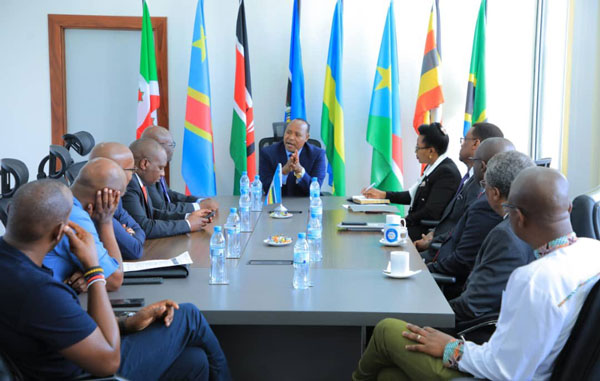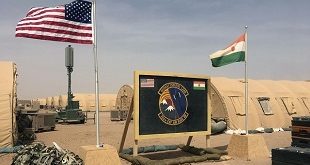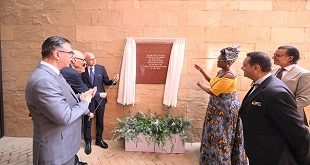
Arusha, Tanzania | THE INDEPENDENT | A regional media regulatory platform has been launched with the aim of harmonising media standards and to create an independent media in the East African Community.
The platform dubbed the East Africa Press Councils (EAPC), serves as an umbrella body bringing together media regulatory authorities within the EAC.
The main objective of the EAPC, which draws its membership from media and press councils in the EAC Partner States, is to promote and protect free, independent, professional and accountable media in East Africa.
In a speech read for him by the Director Social Sectors at the EAC Secretariat, Dr. Irene Isaka, EAC Secretary General Peter Mathuki expressed hope that the coming into being of EAPC would lead to a more free, independent and vibrant media that will in turn promote the tenets of democracy, social justice and respect for human rights across the entire EAC region that now stretches from the East to the West Coast of Africa.
Dr. Mathuki said that independent and professional journalism is the cornerstone of any democratic dispensation, without which freedom of expression is jeopardised, and so are the basic rights of members of society.
“A vibrant media is essential for the attainment of social justice, rule of law, accountability, equality and protection of human and peoples’ rights. The wider society loses out when media cannot do its work independently and professionally as channels of free expression are strangled and public interest information is stifled, including through deterioration of investigative journalism,” he said.
“Without robust, independent journalism, society, more so the weak, including women and youth, lose out as they have neither means nor relevant information to hold leaders to account and to demand what they are rightly entitled to,” added Dr. Mathuki.
He added that media regulation should therefore aim at enabling effective and accountable media in the service of the people, and not lead to the strangling of media through undue control and over-regulation.
“When media regulators understand this, and they come together in solidarity to champion the promotion of accountable and independent media, then a great stride has been made,” said Dr. Mathuki.
The Secretary General said that the integration process in East Africa is supposed to be people-centred and market driven and so media was key in taking the message of integration to the people at the grassroots who are the actual owners of the integration.
He said that it was crucial that media as a stakeholder in the integration ought to understand the process fully so that they can unpack it in simple language for the ordinary people, adding that empowerment of media on matters integration was therefore key.
“It is our position as EAC that media should undergo training on EAC integration purposely to improve their understanding of the process and build their capacity to report more objectively and accurately on integration,” said Dr. Mathuki.
Mohbare Matinyi, the Tanzania Director of Information Services Government Spokesman, urged the media to take advantage of the new technologies to educate and inform people on key issues that matter to them, be it cultural, political or economic.
Mohbare, who spoke on behalf of Tanzania’s Minister of Information, Communication and Technology, Nape Moses Nauye, said that the media industry is today undergoing unavoidable transformation due to the impact of technology on professional journalism.
He therefore cautioned against the use of digital media by individuals keen on promoting their own selfish interests.
Mohbare expressed hope that through EAPC, the media and press councils would find an ideal forum to share experiences and discuss regulatory issues in the region and advise their respective governments and media houses on how to achieve the objectives of a free, independent, professional, ethical, accountable, patriotic and responsible media.
On his part, Kajubi Mukajanga, the Chairperson of the EAPC and Executive Director of the Media Council of Tanzania, said that EAPC would work to strengthen and promote the institution of independent media regulatory bodies in East Africa.
This according to him, would create awareness, and promote the concept of self-regulation through Press/Media Councils as a viable option for holding the media accountable in the region while promoting media pluralism and diversity.
The EAPC Secretary and Chief Executive Officer of the Media Council of Kenya, David Omwoyo, said that having universal media standards across the entire EAC region was critical if the media industry was to grow at a uniform pace and play its watchdog role effectively.
Omwoyo said that it was challenging to have different media regulatory standards in the Partner States across the region.
In his remarks, the EAPC Treasurer and Executive Secretary of the Rwanda Media Commission, Emmanuel Mugisha, disclosed that Rwanda was using media literacy to ensure that youth and members of the public are adequately prepared to use the media space especially the social media responsibly.
Mugisha said that Rwanda was also trying to empower the media to become more viable in its role of informing and educating members of the public for purposes of personal growth and sustainable development.
He added that Rwanda was encouraging her media to promote Pan-African stories to correct the negative image of Africa by western media over the years.
“As Africans, we need to tell our own story, stories that are in our own favour and portray a just image of ourselves,” he said.
***
URN
 The Independent Uganda: You get the Truth we Pay the Price
The Independent Uganda: You get the Truth we Pay the Price


